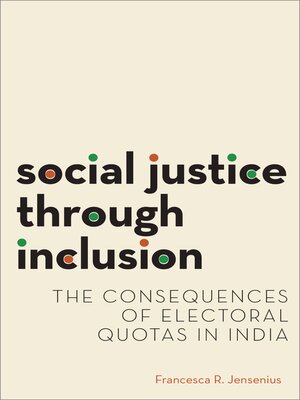Social Justice through Inclusion
ebook ∣ The Consequences of Electoral Quotas in India · Modern South Asia
By Francesca R. Jensenius

Sign up to save your library
With an OverDrive account, you can save your favorite libraries for at-a-glance information about availability. Find out more about OverDrive accounts.
Find this title in Libby, the library reading app by OverDrive.



Search for a digital library with this title
Title found at these libraries:
| Library Name | Distance |
|---|---|
| Loading... |
Across the world, governments design and implement policies with the explicit goal of promoting social justice. But can such institutions change entrenched social norms? And what effects should we expect from differently designed policies? Francesca R. Jensenius' Social Justice through Inclusion is an empirically rich study of one of the most extensive electoral quota systems in the world: the reserved seats for the Scheduled Castes (SCs, the former "untouchables") in India's legislative assemblies. Combining evidence from quantitative datasets from the period 1969-2012, archival work, and in-depth interviews with politicians, civil servants, and voters across India, the book explores the long-term effects of electoral quotas for the political elite and the general population. It shows that the quota system has played an important role in reducing caste-based discrimination, particularly at the elite level. Interestingly, this is not because the system has led to more group representation - SC politicians working specifically for SC interests - but because it has made possible the creation and empowerment of a new SC elite who have gradually become integrated into mainstream politics. This is a study of India, but the findings and discussions have broader implications. Policies such as quotas are usually supported with arguments about various assumed positive long-term consequences. The nuanced discussions in this book shed light on how electoral quotas for SCs have shaped the incentives for politicians, parties, and voters, and indicate the trade-offs inherent in how such policies of group inclusion are designed.







